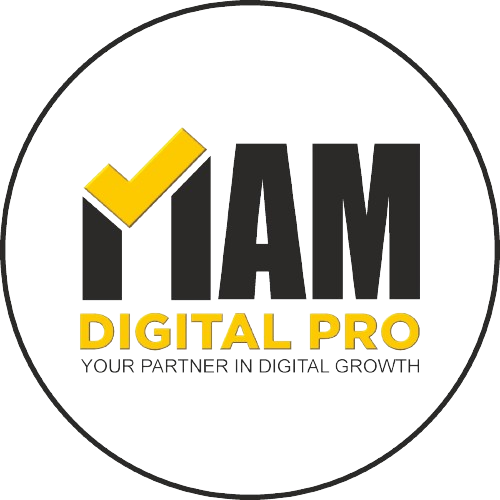Digital marketing agencies have become increasingly popular over the past few years. With more and more businesses going online, the demand for digital marketing services has skyrocketed. As a result, the competition in digital marketing has also increased.
Suppose you want to stand out in such a competitive environment. In that case, digital marketing agencies must have a solid online presence. This blog post will discuss seven effective ways to market your digital marketing agency online.
Build a Professional Website for a Digital Marketing Agency
A professional website is crucial to any digital marketing agency’s online presence. Your website is often the first interaction potential clients have with your agency, so it should make a strong impression. Your website should be visually appealing, easy to navigate, and communicate your agency’s services and value proposition.
Ensure your website is optimized for search engines and has a fast loading time. A slow website can negatively impact user experience and increase bounce rates. Additionally, ensure your website is mobile-friendly, as most internet users browse the web on mobile.
Create High-Quality Content
Creating high-quality content is an effective way to market your digital marketing agency online. You can showcase your agency’s expertise by creating blog posts, whitepapers, e-books, and other types of content. Share the content on social media and your website.
When creating content, ensure it is relevant to your target audience and provides value. Use SEO best practices to optimize your content for search engines. Include a call to action to encourage visitors to take the next step, such as subscribing to your newsletter or contacting your agency for more information.
Leverage Social Media
Social media is a powerful tool for marketing your digital marketing agency online. Platforms such as LinkedIn, Twitter, Instagram, and Facebook can help you reach a large audience and engage with potential clients.
Create social media profiles for your agency and regularly post updates, news, and insights. Share your content on social media and engage with your followers by responding to comments and messages. Use social media advertising to reach a larger audience and promote your services.
Use Email Marketing
Email marketing is an effective way to reach potential clients and stay top-of-mind with existing clients. Build an email list by offering incentives such as free e-books or webinars, and regularly send newsletters and updates to your subscribers.
Personalize your emails and make sure they provide value to your subscribers. Include a call to action encouraging recipients to visit your website or contact your agency for more information.
Offer Free Consultations
Free consultations are an excellent way to attract potential clients and showcase your agency’s expertise. A free consultation allows you to understand the client’s needs and provide recommendations for their digital marketing strategy.
Listen to the client’s needs during the consultation and provide actionable insights. Show them examples of your previous work and provide testimonials from satisfied clients.
Utilize Search Engine Optimization (SEO)
Search engine optimization (SEO) is optimizing your website to rank higher in search engine results pages (SERPs). Improving your website’s SEO can increase your visibility and attract more potential clients.
Research relevant keywords and include them in your website’s content and metadata. Ensure that your website’s structure and navigation are user-friendly and load quickly. Use backlinks to improve your website’s authority and credibility.
Attend Conferences and Networking Events
Attending conferences and networking events is an effective way to meet potential clients and showcase your agency’s expertise. Look for events relevant to your industry and follow them regularly.
During these events, ensure you have business cards and marketing materials. Be prepared to pitch your agency’s services and provide examples of your previous work. Take the time to listen to potential clients and understand their needs so that you can tailor your products and services according to customers’ needs.
Conclusion
Marketing your digital marketing agency online can be challenging. Still, by implementing these seven effective strategies, you can reach a broader audience, attract potential clients, and stay ahead of the competition.
FAQs
1. What are some effective online marketing strategies for promoting my digital marketing agency?
Some effective online strategies include content marketing through blogging, social media marketing on platforms like LinkedIn, Twitter, and Facebook, search engine optimization to improve rankings on Google, paid advertising through Google Ads and social media ads, email marketing to build an email list and send regular updates, webinars or online events to demonstrate thought leadership, and creating informational videos to be hosted on YouTube or your website. Focus on providing value rather than blatant self-promotion.
2. How can I differentiate my digital marketing agency from competitors online?
Focus on developing a unique brand identity and positioning. Highlight your team’s expertise and experience. Use client testimonials and case studies to showcase successful work. Emphasize any specialties or proprietary methods your agency uses. Share insights and thought leadership content to establish authority. Use your website and content to tell your agency’s story and why clients should choose you over competitors.
3. What platforms should I be leveraging to market my services?
Some of the top platforms to leverage include your company website, blog and resources pages to attract visitors; LinkedIn to connect with professionals, share content, and showcase your team; Facebook and Twitter to engage followers, promote content, and run ads; Instagram and YouTube to post visual content and build your brand; Google My Business to improve local SEO; and Quora and industry forums to demonstrate expertise.
4. How can I generate more referrals for my digital marketing agency?
To generate referrals, ensure current clients are satisfied so they will recommend you. Ask happy clients for testimonials, reviews and referrals. Send them referral forms or links to make it easy to recommend you. Offer referral incentives or rewards. Host events where clients and prospects can network. Get involved in your local business community to build relationships. Partner with complementary service providers who can refer clients. Use LinkedIn to connect with ideal prospects.
5. What types of content should I create to attract potential clients?
Aim to create a variety of content like blog posts and articles that provide tips, how-to guides, and actionable advice; videos that give overviews of your services or thought leadership interviews; case studies and client success stories; SlideShare presentations on relevant digital marketing topics; infographics, charts, and visual content that make data easy to consume; whitepapers, ebooks, and guides that solve problems for your target audience.
6. How important is SEO and keyword research for generating leads?
Very important! You need a website optimized for SEO with keywords your ideal clients are searching for so you rank high in search results and get found online. Research keywords clients use to find agencies like yours. Incorporate these keywords into titles, headers, content, URLs, meta descriptions, alt text, and more. Producing targeted content around these terms will help improve your SEO and attract more visitors.
7. What is a reasonable budget to allocate for PPC ads to market my services?
A reasonable starting budget for PPC ads is around $500-1000 per month. Make sure to track conversion metrics so you can gauge ROI. Monitor keyword costs and optimize towards most relevant and cost-effective terms. See which platforms (Google, LinkedIn, Facebook, etc) drive the most conversions and focus budget there. Adjust monthly spend based on performance and seasonality. Set targets for key performance indicators and measure against those goals.
8. How can I create retargeting ads to bring site visitors back?
Install tracking pixels on your site and set up remarketing ad campaigns through Google, Facebook, LinkedIn, etc. Target visitors who reached specific pages but didn’t convert with customized ads promoting your services when they visit other sites. Create remarketing lists based on visitors’ pages visited, location, interests, tech used, time on site and more. Test different creative, offers, and calls to action. Follow up with emails to visitors with drip campaigns. Retargeting helps bring potential customers back and converts more leads.
9. What metrics should I track to determine the effectiveness of my marketing strategies?
Important metrics to track include website traffic, leads generated, cost per lead, conversions rates, ROI per channel, engagement on content and social posts, email open/clickthrough rates, sales inquiries and client acquisitions from marketing efforts, and rankings on relevant keyword terms. Use analytics platforms to monitor traffic sources, visitor behavior, and conversion funnels. Measure against targets monthly and assess what’s working well. Identify problem areas and optimize efforts accordingly.
10. How can I stay up-to-date on the latest trends and changes in digital marketing?
Subscribe to relevant blogs, podcasts, and email newsletters. Follow thought leaders on social media. Join marketing groups and associations. Attend conferences and events. Take online courses on platforms like Coursera. Set up Google Alerts for news on latest developments. Stay on top of updates from Google, Facebook, LinkedIn and other major platforms. Read books on marketing. Reach out to peers in the industry to exchange ideas. Staying current on the latest digital marketing knowledge and tactics is key for success.

